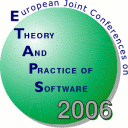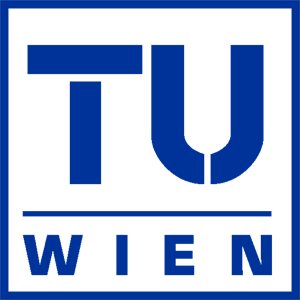12th. International Conference on
TOOLS AND ALGORITHMS FOR THE CONSTRUCTION
AND ANALYSIS OF SYSTEMS
TACAS 2006 programme
| Part of ETAPS 2006 |
CONFERENCE DESCRIPTION
TACAS is a forum for researchers, developers and users interested in rigorously based tools for the construction and analysis of systems. The conference serves to bridge the gaps between different communities --- including but not limited to those devoted to formal methods, software and hardware verification, static analysis, programming languages, software engineering, real-time systems, and communications protocols --- that share common interests in, and techniques for, tool development. In particular, by providing a venue for the discussion of common problems, heuristics, algorithms, data structures and methodologies, TACAS aims to support researchers in their quest to improve the utility, reliability, flexibility and efficiency of tools for building systems.
TACAS is a member conference of the European Joint Conferences on Theory and Practice of Software (ETAPS), which is the primary European forum for academic and industrial researchers working on topics relating to Software Science. ETAPS 2006 is the ninth joint conference in this series. The conference is organized by the Vienna University of Technology. The prior conferences have been ETAPS 98 in Lisbon, ETAPS 99 in Amsterdam, ETAPS 2000 in Berlin, ETAPS 2001 in Genova, ETAPS 2002 in Grenoble, ETAPS 2003 in Warsaw, and ETAPS 2004 in Barcelona, and ETAPS 2005 in Edinburgh.
CALL FOR PAPERS
Tool descriptions and case studies with a conceptual message and theoretical papers with a clear link to tool construction are all encouraged. The specific opics covered by the conference include, but are not limited to, the following:
- Specification and verification techniques for finite and infinite state systems
- Software and hardware verification
- Theorem-proving and model-checking
- System construction and transformation techniques
- Static and run-time analysis
- Abstract interpretation
- Compositional and refinement-based methodologies
- Testing and test-case generation
- Analytical techniques for secure, real-time, hybrid, safety-critical or dependable systems
- Integration of formal methods and static analysis in high-level hardware design
- Tool environments and tool architectures
- Applications and case studies
As TACAS addresses a heterogeneous audience, potential authors are strongly encouraged to write about their ideas in general and jargon-independent, rather than application- and domain-specific, terms. Authors reporting on tools or case studies are strongly encouraged to indicate how their experimental results can be reproduced and confirmed independently.
As a part of ETAPS, TACAS adheres to ETAPS submission and notification deadlines.
IMPORTANT DATES
- Friday 7 October 2005: Submission deadline for abstracts
- Friday 14 October 2005: Submission deadline for full papers (strict)
- Friday 9 December 2005: Notification of acceptance/rejection
- Friday 6 January 2006: Camera-ready version due
- Saturday 25 March to Sunday 2 April 2006: ETAPS 2006
SUBMISSION INFORMATION
As with other ETAPS conferences, TACAS accepts two types of contributions: research papers and tool demonstration papers. Both types will appear in the proceedings and have presentations during the conference. A condition of submission is that an author attends to give the presentation. All submitted papers must be unpublished and not submitted for publication elsewhere. In particular, simultaneous submission of the same contribution to multiple ETAPS conferences is forbidden.
Papers should be submitted electronically in PDF. The proceedings will be published in the Springer-Verlag Lecture Notes in Computer Science series. Final papers will be in the format specified by Springer-Verlag at the URL: www.springer.de/comp/lncs/authors.html. It is recommended that submissions adhere to the specified format and length. Submissions that are clearly too long may be rejected immediately.
RESEARCH PAPERS:
Final papers will be not more than 15 pages long, and should present original research. Additional material intended for the referee but not for publication in the final version - for example details of proofs - may be placed in a clearly marked appendix that is not included in the page limit.
TOOL DEMONSTRATION PAPERS:
Submissions should consist of two parts.
- The first part, at most four pages, should describe the tool presented. Please include the URL of the tool (if available) and provide information which illustrates the maturity and robustness of the tool. (This part will be included in the proceedings.)
- The second part, at most six pages, should explain how the demonstration will be carried out and what it will show, including screen dumps and examples. (This part will be not be included in the proceedings, but will be evaluated.)
PROGRAM COMMITTEE CHAIRS
- Holger Hermanns, Saarland University, Saarbrücken (Germany)
- Jens Palsberg, UCLA (USA)
Tool Chair
- Thierry Jeron, IRISA, Rennes (France)
Invited Speaker
- Somesh Jha, University of Wisconsin (USA)
PROGRAM COMMITTEE
- Armin Biere (Johannes Kepler University, Linz - Austria)
- Ed Brinksma (ESI and University of Twente - the Netherlands)
- Gianfranco Ciardo (University of California, Riverside - USA)
- Alessandro Cimatti (ITC-IRST, Trento - Italy)
- Rance Cleaveland (SUNY, Stony Brook - USA)
- Hubert Garavel (INRIA Rhones-Alpes, Grenoble - France)
- Andy Gordon (Microsoft Research, Cambridge - England)
- Orna Grumberg (Technion, Haifa - Israel)
- Klaus Havelund (Kestrel Technology, Palo Alto, California - USA)
- Holger Hermanns (Saarland University, Saarbrücken - Germany)
- Michael Huth (Imperial College, London - England)
- Thierry Jeron (IRISA, Rennes - France)
- Kim Larsen (Aalborg University, Aalborg - Denmark)
- Ken McMillan (Cadence, Berkely - USA)
- Peter Niebert (University of Provence, Marseille, France)
- Jens Palsberg, UCLA (USA)
- Anna Phillipou (University of Cyprus, Nicosia - Cyprus)
- Jaco van de Pol (CWI, Amsterdam - the Netherlands)
- John Rushby (SRI, Menlo Park, USA)
- David Sands (Chalmers University of Technology, Goeteborg - Sweden)
- Helmut Seidl (Technical University of Munich, Munich - Germany)
- Bernhard Steffen (University of Dortmund, Dortmund - Germany)
- Martin Steffen (University of Kiel, Kiel - Germany)
- Zhendong Su (University of California, Davis - USA)
- Wang Yi (Uppsala University, Uppsala - Sweden)
- Lenore Zuck (University of Illinois, Chicago - USA)
TACAS STEERING COMMITTEE
- Ed Brinksma (ESI and Univ. of Twente, The Netherlands)
- Rance Cleaveland (SUNY at Stony Brook - USA)
- Kim Larsen (Aalborg Univ. - Denmark)
- Bernhard Steffen (Univ. Dortmund - Germany)
- Lenore Zuck (University of Illinois, Chicago - USA)

